- Will Hariri Come Back to Lebanon’s Politics?
- BAE Profits Rise Sharply as Ukraine War and Gaza Genocide Boost UK Arms Exports
- Iran Navy Commander Criticizes Extra-Regional Fleets Operating in West Asia
- Iran FM, IAEA Head Discuss Framework for Potential Iran–US Deal
- Pezeshkian: Iran–Russia Ties Enter New Phase with Completion of Corridor Projects
- Iran, Russia to Stage Joint Naval Exercise Thursday in The Sea of Oman and Northern Indian Ocean
- Global Media Attention on Iranian Leader’s New Statements amid New Talks with the US
- IRGC Navy’s Strait of Hormuz Drills Tells US Who’s the Boss in Persian Gulf
- Leader Warns Warships Could Be Sunk in Response to Trump’s Threats
- IRGC Naval Forces Ready to Block Strait of Hormuz Upon Orders: Commander
Editor's Choice

Gen. Solemani, A Living Resistance Legacy General Solemani of Iran caused a transformation to the region that blocked the way of the Israeli and American projects in West Asia.
A Review of Newly Published US National Security Document The US national security document may be an unwanted admission that the US hegemony is diminishing.
US or Venezuela? Who’s the True Oil Thief? Trump says Venezuelan nationalization of its oil was theft of American oil companies’ assets, justifying oil blockade on South American nation.
Why Are Tel Aviv and Washington Stepping Up Pressures against Hezbollah? Israel knows that disarming Hezbollah makes occupation of Lebanon a piece of cake.
Is Yemen on the Verge of Split? The country is sinking in chaos as conflicting forces in the south are going separate ways and Yemenis are less involved in the fate of the south.
News

BAE Profits Rise Sharply as Ukraine War and Gaza Genocide Boost UK Arms Exports
BAE Systems’ 2025 record profits highlight UK’s controversial role in global military engagements amid soaring defense spendingIran Navy Commander Criticizes Extra-Regional Fleets Operating in West Asia Rear Admiral Shahram Irani stresses that Iran is prepared to counter any foreign military presence
Iran FM, IAEA Head Discuss Framework for Potential Iran–US Deal Iranian Foreign Minister Abbas Araghchi and IAEA chief Rafael Grossi discussed the results of the latest indirect Iran–US negotiations on Wednesday
Pezeshkian: Iran–Russia Ties Enter New Phase with Completion of Corridor Projects President Masoud Pezeshkian said completed joint transit corridor projects will mark a new chapter in Iran–Russia relations
Iran, Russia to Stage Joint Naval Exercise Thursday in The Sea of Oman and Northern Indian Ocean Iranian and Russian naval forces will hold a joint exercise on Thursday in the Sea of Oman and the northern Indian Ocean
Leader Warns Warships Could Be Sunk in Response to Trump’s Threats The Leader of the Islamic Revolution said Iran’s weapons that can target American carriers are “more dangerous” than the ships
IRGC Naval Forces Ready to Block Strait of Hormuz Upon Orders: Commander Rear Admiral Tangsiri, commander of Iran’s IRGC Navy, stated that Iran is ready to close the Strait of Hormuz whenever ordered by senior officials
President Pezeshkian Extends National Day Congratulations to Japan Iranian President Masoud Pezeshkian has extended his congratulations to Japanese Prime Minister Sanae Takaichi on Japan’s National Day
IRGC Continues Military Drills in The Strait of Hormuz for A Second Day The Islamic Revolutionary Guard Corps (IRGC) is continuing naval drills in the Strait of Hormuz for a second day
Iran’s FM Says Indirect Talks with US Show Solid Progress, Path Forward Now Clear Latest round of sanctions-relief talks with the United States ended with agreement on a framework of guiding principles for future negotiations
How Do Americans Look at a Potential War against Iran? The American citizens, as well as political observers and even military officials, question Trump’s main aim behind waging a war against Iran.
Hamas Flags ‘Dangerous Precedent’ As Israel Increases Control Over al-Quds Hamas criticizes Israel’s expansion of al-Quds municipal boundaries beyond the Green Line
PMF, Iraqi Military Launch Coordinated Strike on ISIS Remnants Iraq’s PMF, alongside the army, launches a major operation in the Nineveh desert targeting ISIS remnants
Iran Pursues Talks, Rejects Threats: Security Chief Iran’s security chief says Tehran is pursuing negotiations while maintaining deterrence against any act of aggression
Geneva Hosts Iran–IAEA Talks Ahead of Indirect Negotiations with Washington Iranian Foreign Minister Abbas Araghchi met with International Atomic Energy Agency Director General Rafael Grossi in Geneva, Switzerland
Araghchi Arrives in Geneva for Diplomatic Talks Iran’s Foreign Minister Seyyed Abbas Araghchi arrived in Geneva late Sunday to lead diplomatic and technical consultations
Baghaei: Sanctions on Iranians Are a Crime Against Humanity Imposing economic pressure and causing hardship to the Iranian people constitutes a crime against humanity
Hezbollah Leader Says Iran Has Consistently Backed Palestine and Oppressed People Worldwide The Islamic Republic of Iran has been a steadfast supporter of Palestine and defenders of the oppressed worldwide
A New War Would Have Traumatic Effects on All Sides Another war against Iran by the United States would be highly traumatic and harmful for all
Israel Kills Nine Palestinians on the 128th Day of The Gaza Ceasefire On the 128th day of the Gaza ceasefire, Israeli occupation forces continued violations
Most Viewed
Iran, Russia to Stage Joint Naval Exercise Thursday in The Sea of Oman and Northern Indian Ocean
Global Media Attention on Iranian Leader’s New Statements amid New Talks with the US
Iran FM, IAEA Head Discuss Framework for Potential Iran–US Deal
IRGC Navy’s Strait of Hormuz Drills Tells US Who’s the Boss in Persian Gulf
Pezeshkian: Iran–Russia Ties Enter New Phase with Completion of Corridor Projects
BAE Profits Rise Sharply as Ukraine War and Gaza Genocide Boost UK Arms Exports
Iran Navy Commander Criticizes Extra-Regional Fleets Operating in West Asia
Will Hariri Come Back to Lebanon’s Politics?
Netanyahu Returns Home from Washington Empty Handed
Tehran Calls For ‘Serious’ Changes to EU’s ‘Unconstructive’ Policies
UN Warns of Shocking Paramilitary War Crimes In El Fasher
At Iran Corridor Summit, Pezeshkian Praises Regional Collaboration
New Israeli Law Accelerating West Bank Annexation
As Western-dominated Order Erodes, Many Question MSC Influence
How Pelosi Unmasked the Ineffectiveness of Sanctions on Iran
Israel Kills Nine Palestinians on the 128th Day of The Gaza Ceasefire
A New War Would Have Traumatic Effects on All Sides
Hezbollah Leader Says Iran Has Consistently Backed Palestine and Oppressed People Worldwide
Sex Trafficker Claiming World Leadership: How the Narrative Went Invalid?
Europe Weighing Up Moves for Post-American World Order
Araghchi Arrives in Geneva for Diplomatic Talks
Is Horn of Africa Becoming New Flashpoint after New Rivaling Agreements?
Geneva Hosts Iran–IAEA Talks Ahead of Indirect Negotiations with Washington
With ISIS Inmates Breaking Free, Security Threats Are Back to Iraq
Iran Files Lawsuits at International Courts Over US, Israel Supporting Terrorism
Qassem Expresses His Loyalty to Iran’s Leader and The Nation
Taliban’s New Penal Code Cements Pashtun Rule over Afghanistan
Unity Among Muslims Is an Effective Means of Addressing Tensions and Instability
Foreign Minister Araghchi: Negotiations Ineffective Under Threat of Force
Iran Intelligence Ministry Criticizes EU Stance On IRGC
Accountability Demanded for US Actions Against Iran by Foreign Minister Araghchi
Discussions On Global Affairs Between Iranian and Pakistani Foreign Ministers During Phone Call
Ansarullah Warns Of US, Israel Soft War on Middle Eastern Nations
A Leaked Document Reveals the US Plan for Complete Domination of Gaza, According To DSN
From Mercusor or "Mother of Agreements" : EU’s Economic Divorce from the US
Araghchi Slams WEF’s Ethical Decay from Hypocrisy and Double Standards
Will Board of Peace Initiative Lead to Reopening Rafah Border Crossing?
Taliban’s Terrorism Playbook Making Afghanistan an ISIS Breeding Ground
In Focus

Ansarullah
A Zaidi Shiite movement operating in Yemen. It seeks to establish a democratic government in Yemen.
Shiite
represents the second largest denomination of Islam. Shiites believe Ali (peace be upon him) to be prophet"s successor in the Caliphate.
Resistance
Axis of Resistances refers to countries and movements with common political goal, i.e., resisting against Zionist regime, America and other western powers. Iran, Syria, Hezbollah in Lebanon, and Hamas in Palestine are considered as the Axis of Resistance.
Persian Gulf Cooperation Council
A regional political u n i o n consisting of Arab states of the Persian Gulf, except for Iraq.
Taliban
Taliban is a Sunni fundamentalist movement in Afghanistan. It was founded by Mohammed Omar in 1994.
Wahhabism & Extremism
Wahhabism is an extremist pseudo-Sunni movement, which labels non-Wahhabi Muslims as apostates thus paving the way for their bloodshed.
Kurds
Kurds are an ethnic group in the Middle East, mostly inhabiting a region, which spans adjacent parts of Iran, Iraq, Syria, and Turkey. They are an Iranian people and speak the Kurdish languages, which form a subgroup of the Northwestern Iranian branch of Iranian languages.
NATO
The North Atlantic Treaty Organization is an intergovernmental military alliance based on the North Atlantic Treaty which was signed on 4 April 1949.
Islamic Awakening
Refers to a revival of the Islam throughout the world, that began in 1979 by Iranian Revolution that established an Islamic republic.
Al-Qaeda
A militant Sunni organization founded by Osama bin Laden at some point between 1988 and 1989
New node

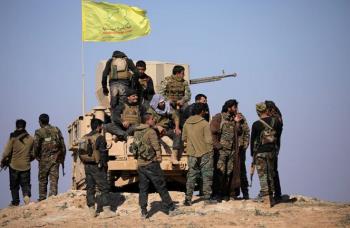
Report
Syria’s North Undergoes New Developments as US Stabs Kurds in the Back
Monday 26 January 2026
Turkey's role in clashes
Though the Kurdish withdrawal from Aleppo and Hasakah seems to be an outcome of a deal with Damascus, the role of some regional actors behind undermining and even destroying Kurdish militias is noticeable. Turkey is one of the countries that has been lurking for s ...
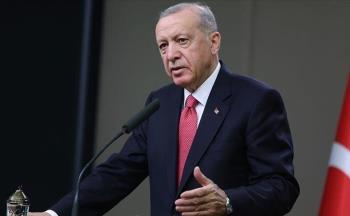
Analysis
The Bear’s Friendship: A Look at Recent Turkish Comments on Iran
Tuesday 27 January 2026
،
Turkey is expected to show greater wisdom in words and actions. Stances that focus on post-war scenarios and refugee crises, rather than emphasizing the prevention of war and supporting diplomatic solutions, not only fail to contribute to regional calm but fuel a propaganda that targets Iranian stab ...
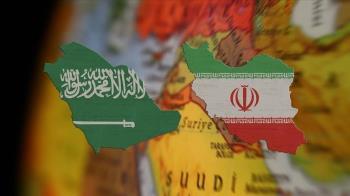
News
Iran And Saudi Arabia Issue Warnings of Potential Harmful Outcomes from Regional Tensions
Wednesday 28 January 2026
،
Turkey’s Foreign Minister Hakan Fidan to discuss reducing tensions in the wake of recent developments.
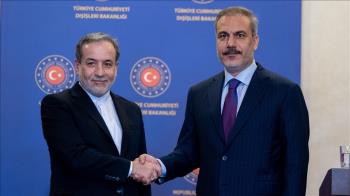
Report
Iran’s Message from Istanbul: No Negotiations on Missiles
Saturday 31 January 2026
،
Turkey of Iran's top diplomat, Araghchi met his counterpart Hakan Fidan and President Recep Tayyip Erdogan. The two sides, media report, discussed de-escalation and further instability in the region.
Araghchi’s message from Turkey
Iranian Foreign Minister, in an interview with CNN ...
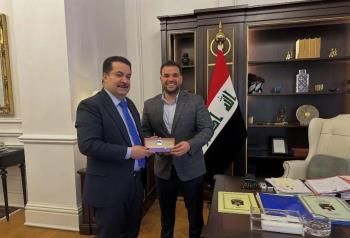
Report
Dismissal of Special Envoy Sawaya Showcase of Trump’s Failure Story in Iraq
Monday 2 February 2026
،
Turkey and special envoy to Syria who had recently visited Erbil to talk to the Syrian Democratic Forces (SDF) leaders, is expected to fill the position.
Two Iraqi officials said that Sawaya was expected to visit Iraq Friday and meet senior officials in Baghdad, but his visit was canceled all ...
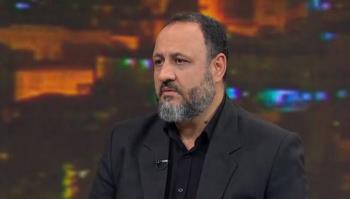
Interview
US Pursuing Own Agenda, not a Deal, behind Iran Negotiations: Expert
Saturday 7 February 2026
،
Turkey was announced as the host country to the talks and representatives of some countries were to participate in the negotiations. It is natural that Iran as a party to the talks has some reservations about the venue as it manages the climate ruling the negotiations. So Oman was picked as a host c ...
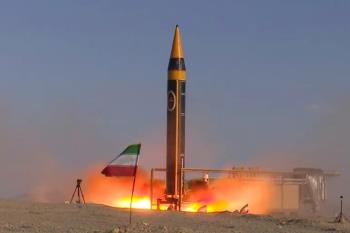
Analysis
Khoramshahr-4, Iranian Missile that’s Changed Trump’s Game
Monday 9 February 2026
،
Turkey.
Now the question is here: What has caused Iran’s military deterrence against the US threats?
Fear of Iranian missile power
A new report from the US Council on Foreign Relations, released just one day after US-Iranian talks in Muscat, has turned its focus to growing concerns over Ir ...
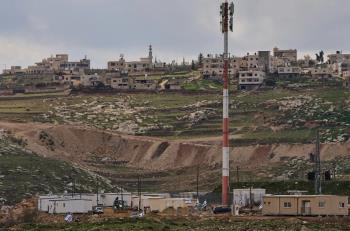
News
The Israeli West Bank Expansion Has Sparked Widespread International Condemnation
Tuesday 10 February 2026
،
Turkey, and Saudi Arabia, has issued a strong joint condemnation of recent Israeli actions in the West Bank. They denounced measures aimed at expanding settlements and establishing a new administrative reality as illegal acts that accelerate de facto annexation and forced displacement. The ministers ...

Analysis
Netanyahu Returns Home from Washington Empty Handed
Thursday 12 February 2026
،
Turkey and Qatar that he had previously rejected outright .
Experts suggest the decision reflects Tel Aviv’s strategic calculations regarding Gaza and Iran, describing it as an option for Netanyahu to align himself with regional powers rather than remain isolated. In reality, Tel Aviv is curr ...

Report
Global Media Attention on Iranian Leader’s New Statements amid New Talks with the US
Wednesday 18 February 2026
،
Turkey's Anadolu Agency reported that Ayatollah Khamenei warned American warships stationed in the Persian Gulf could end up at the bottom of the sea. By highlighting this specific phrasing, the news agency centered its narrative on what it framed as a direct message of deterrence aimed at the U ...










